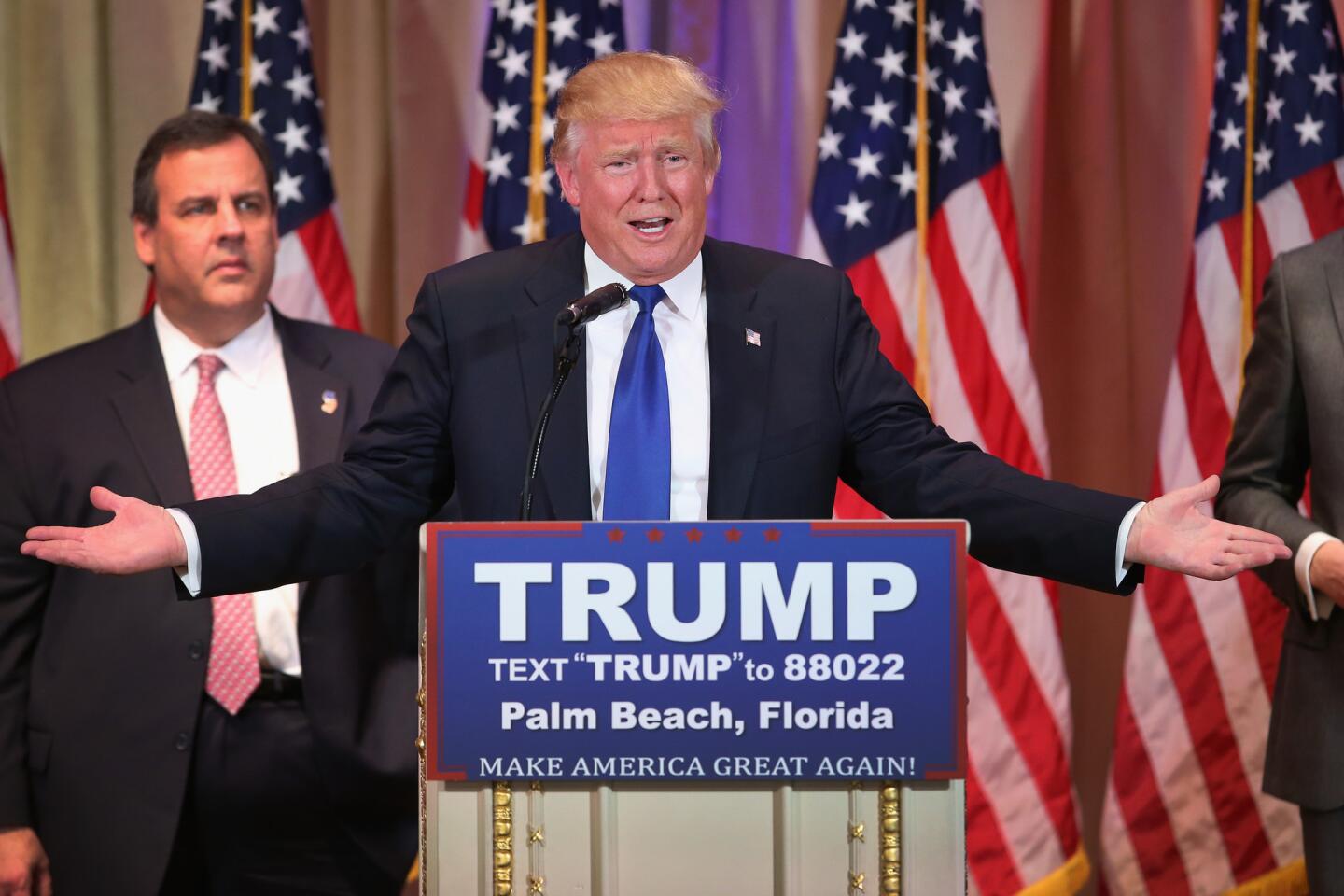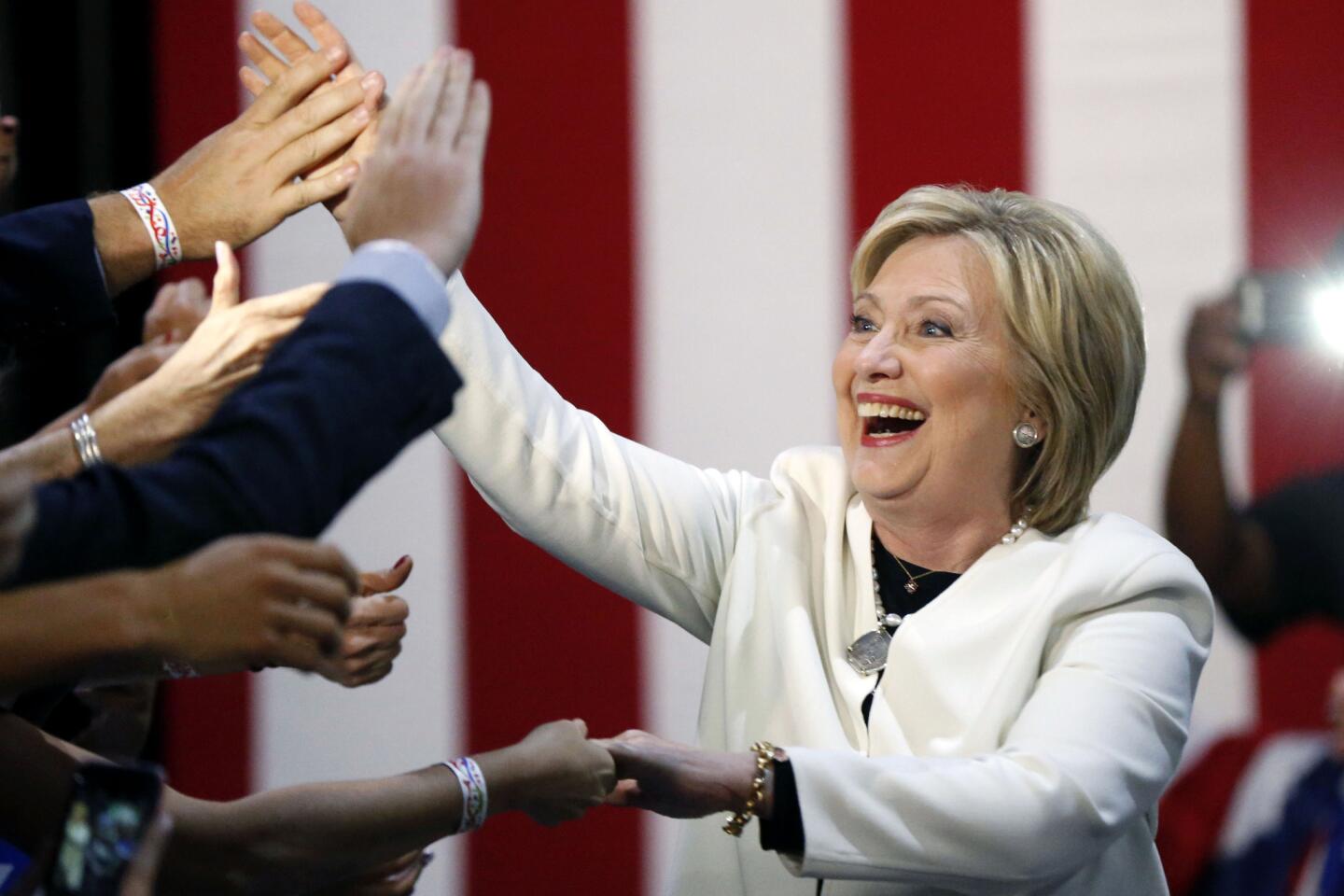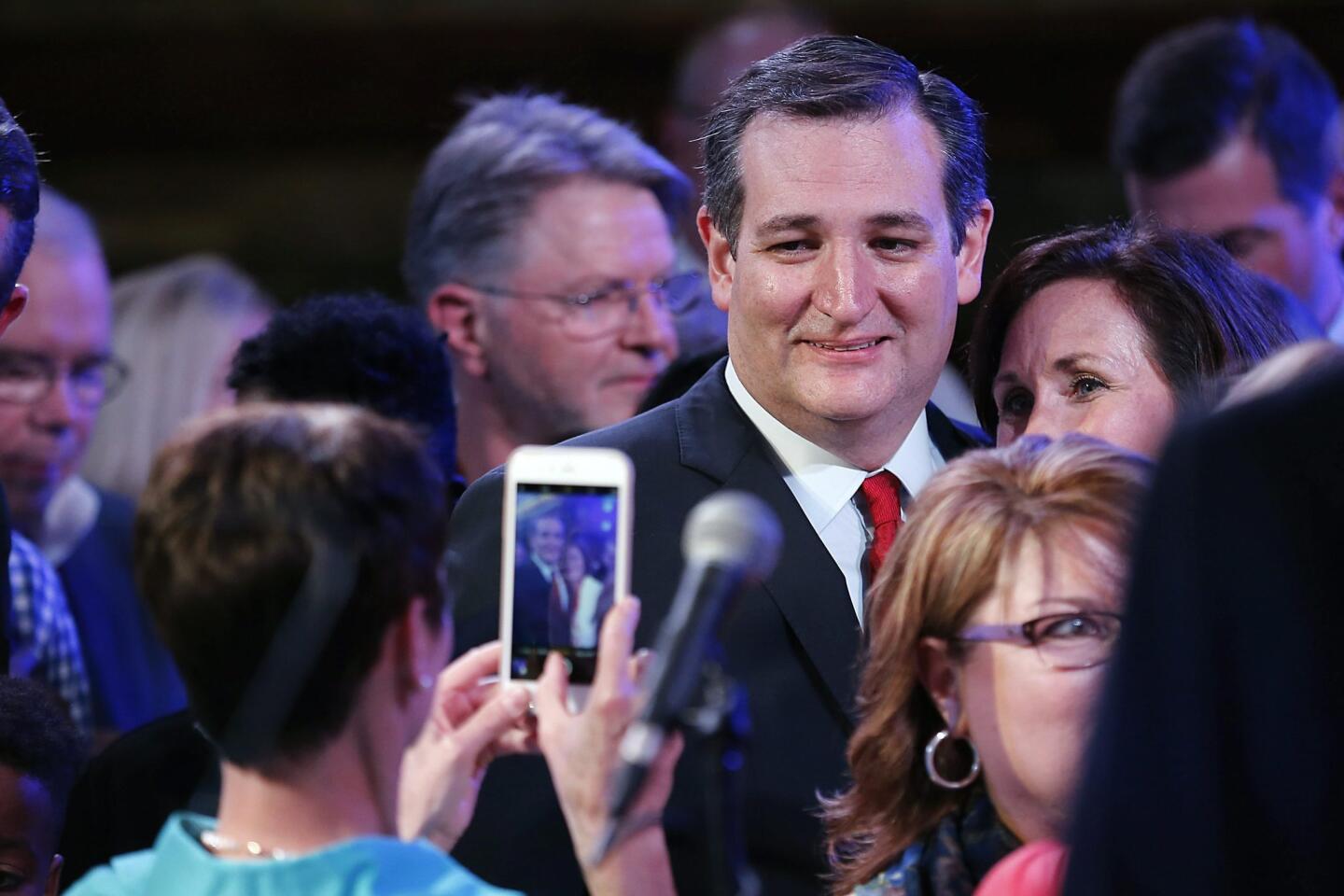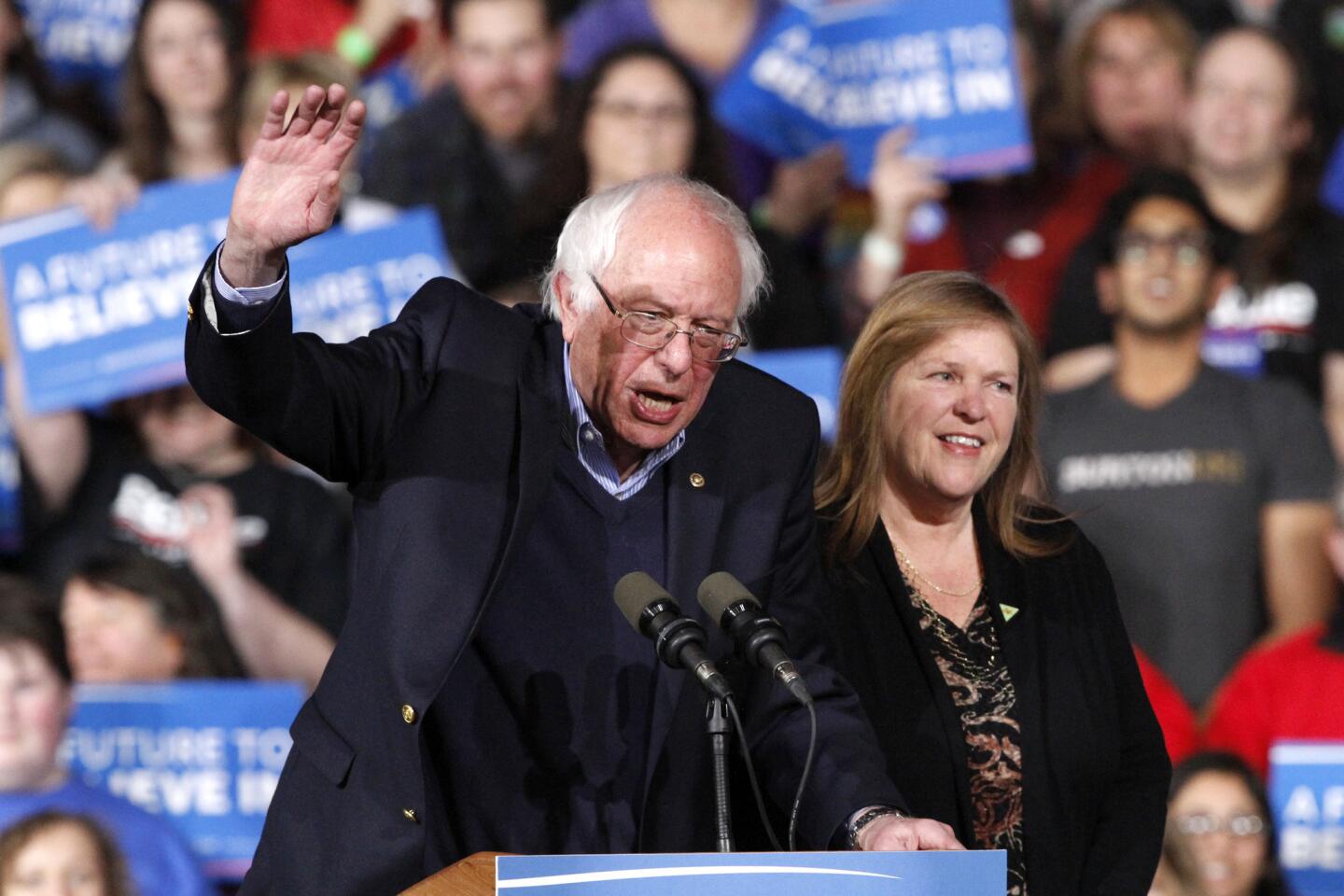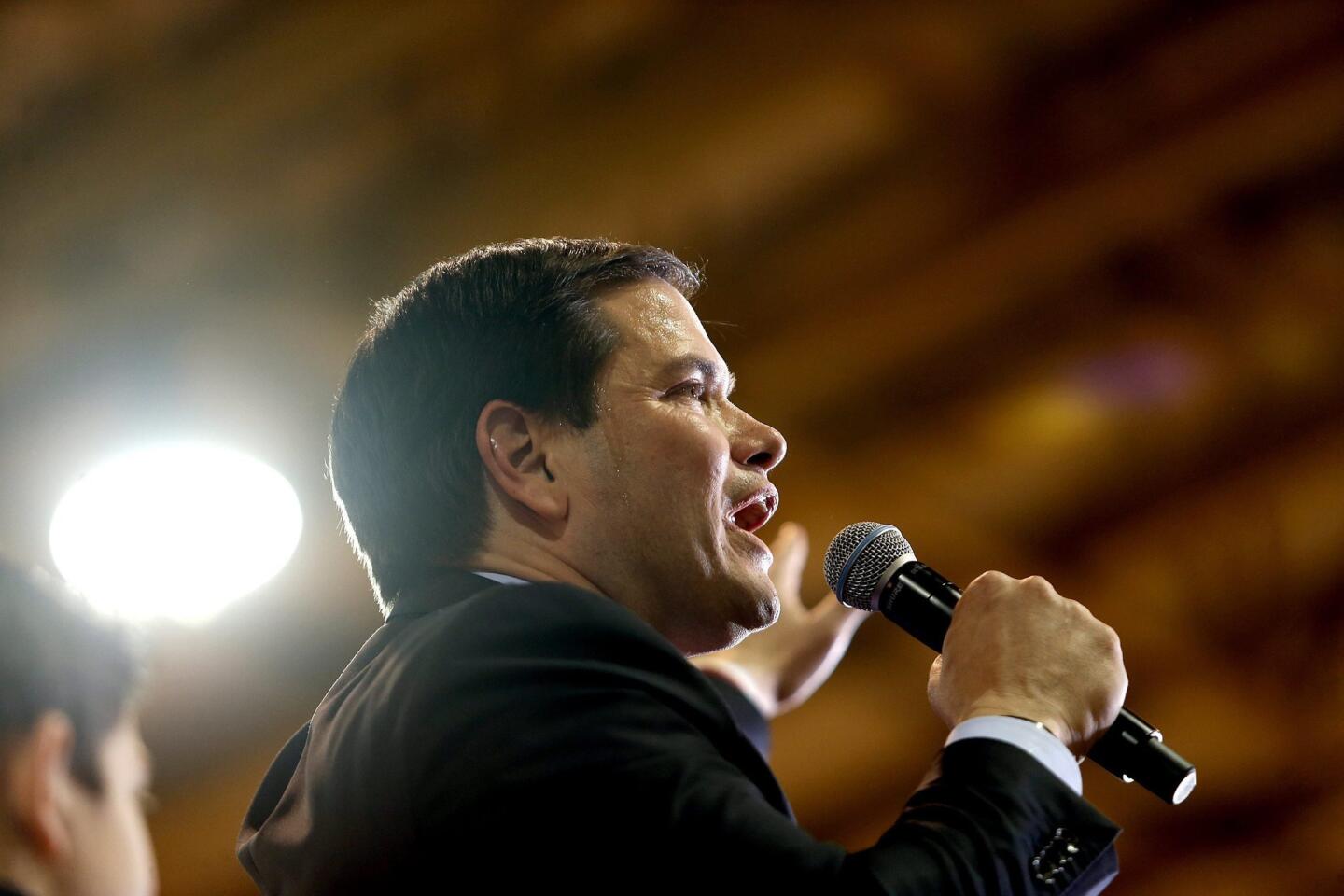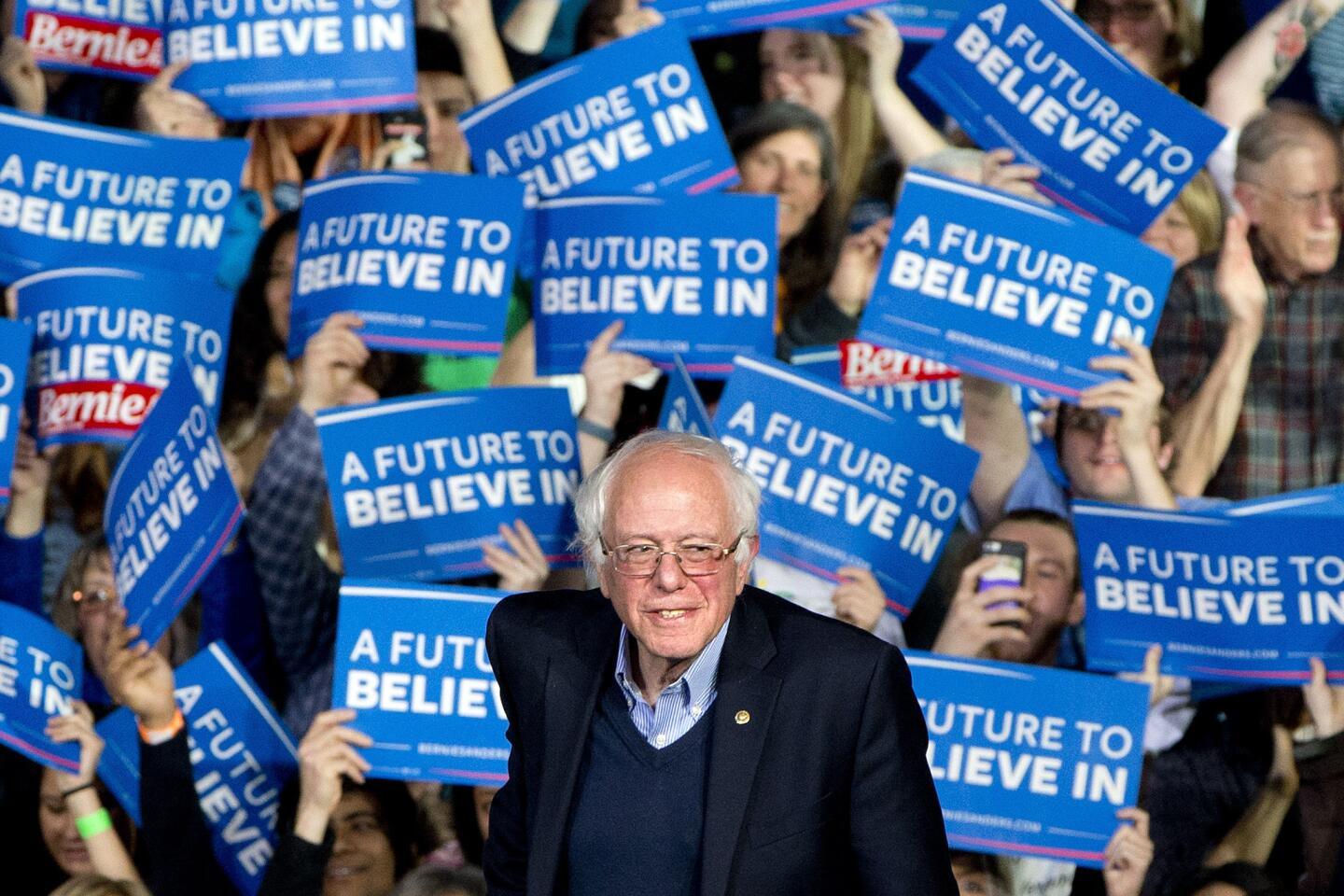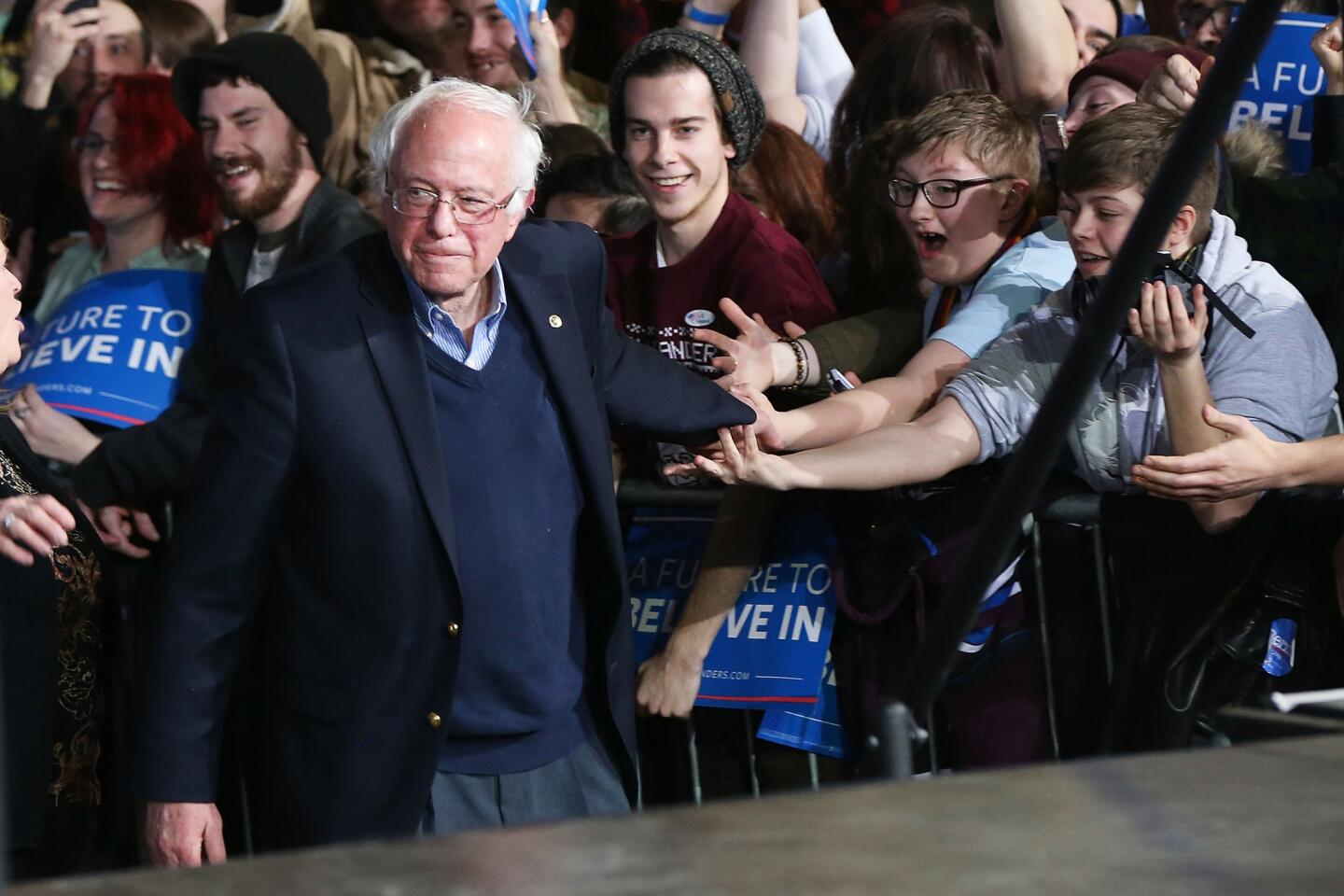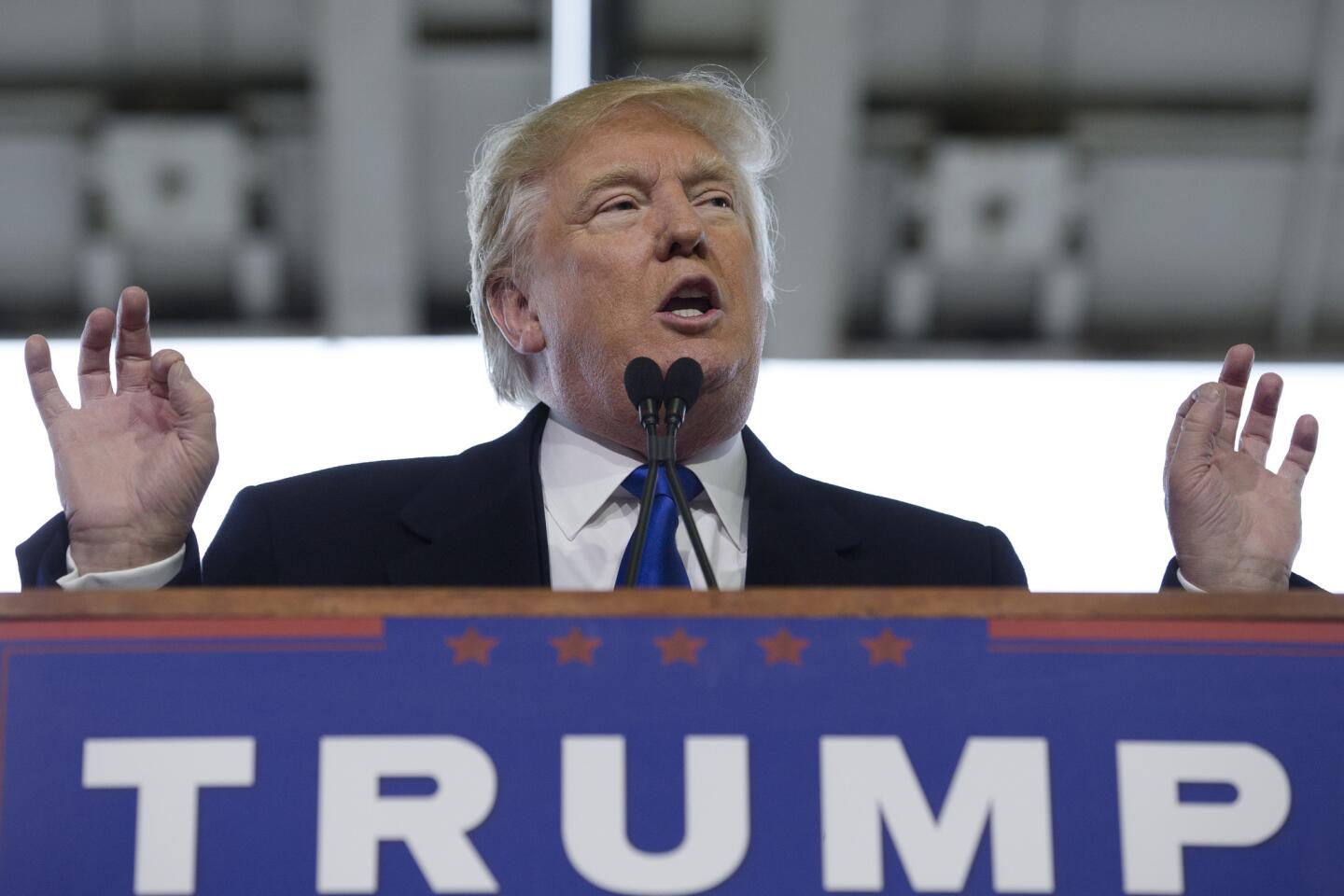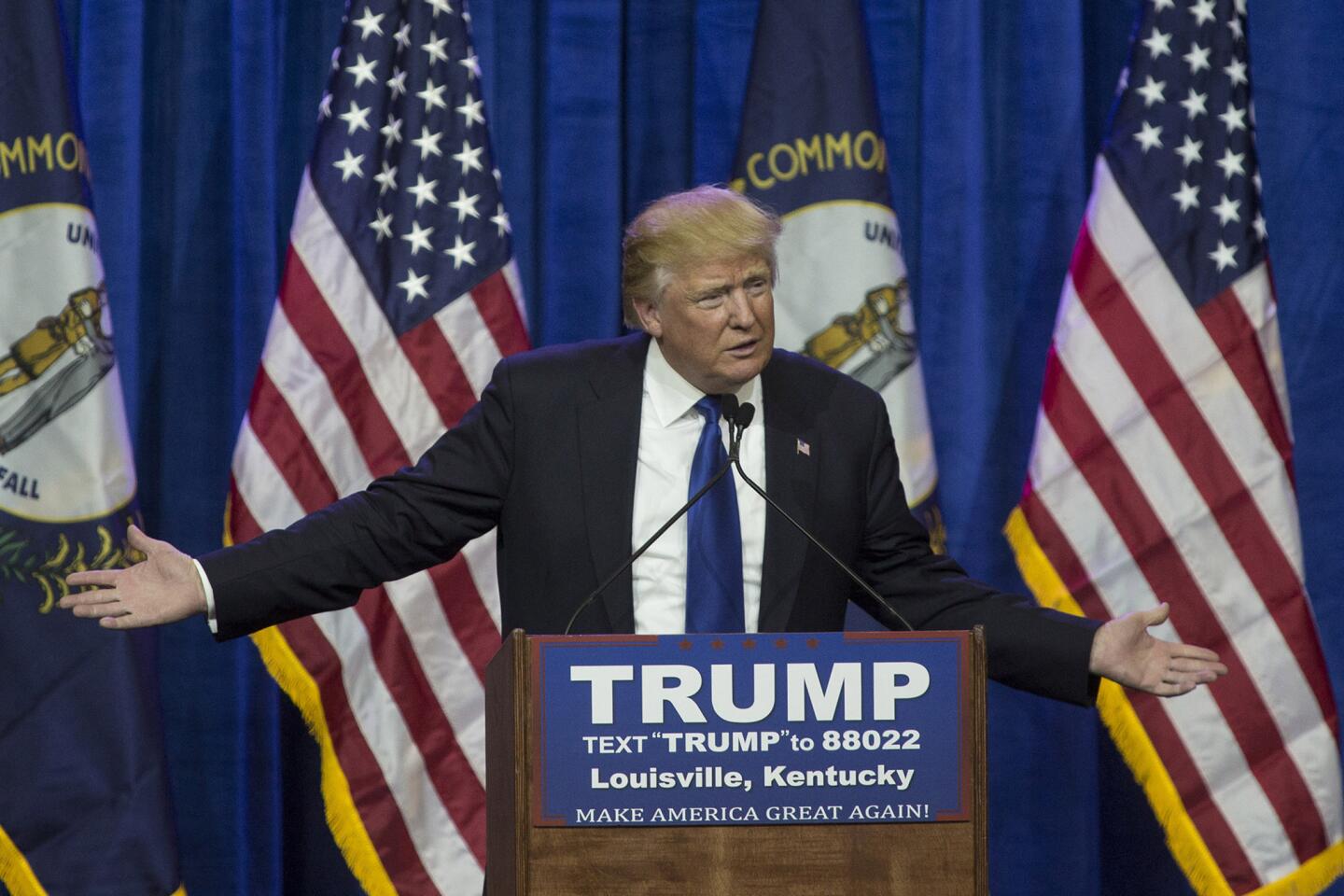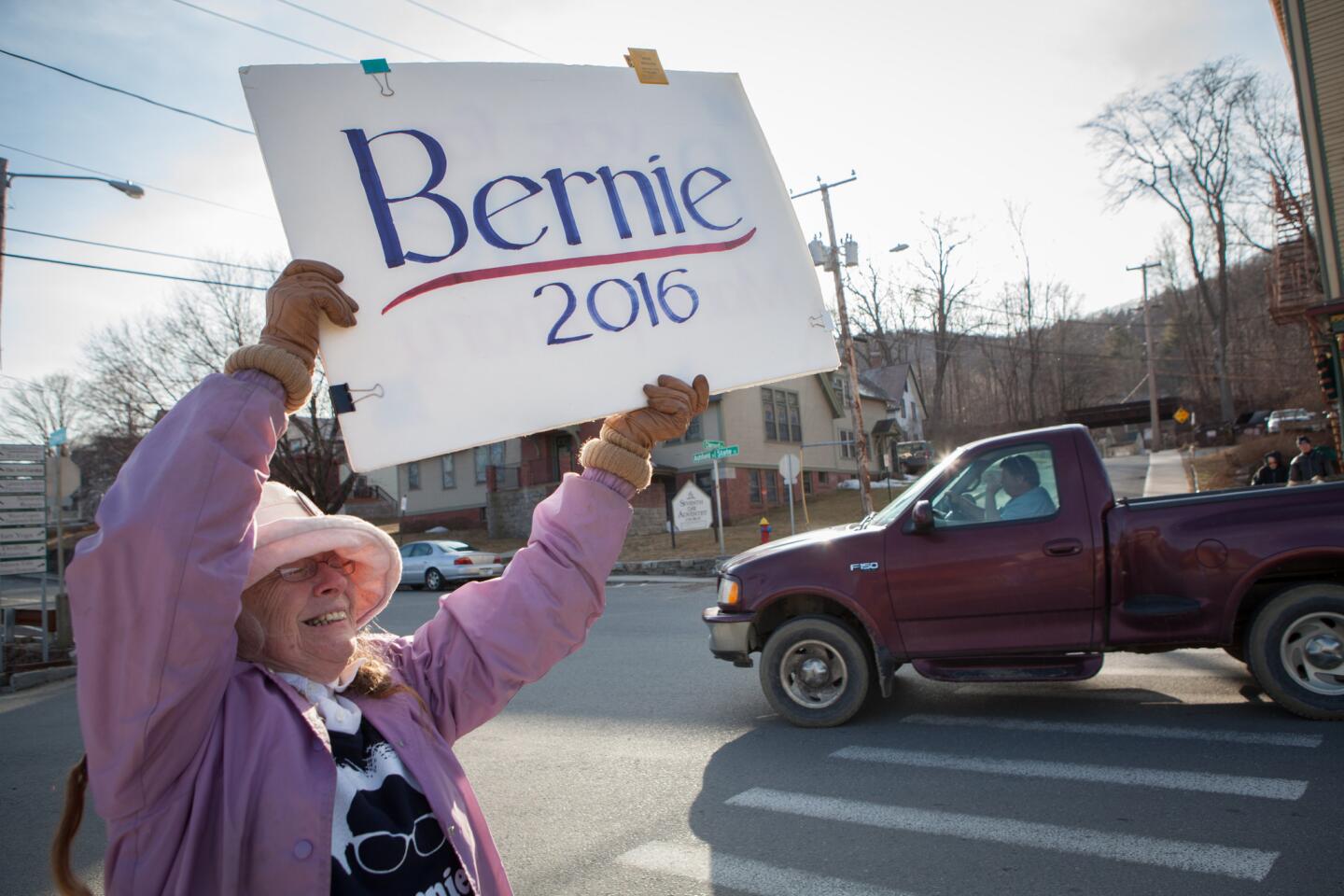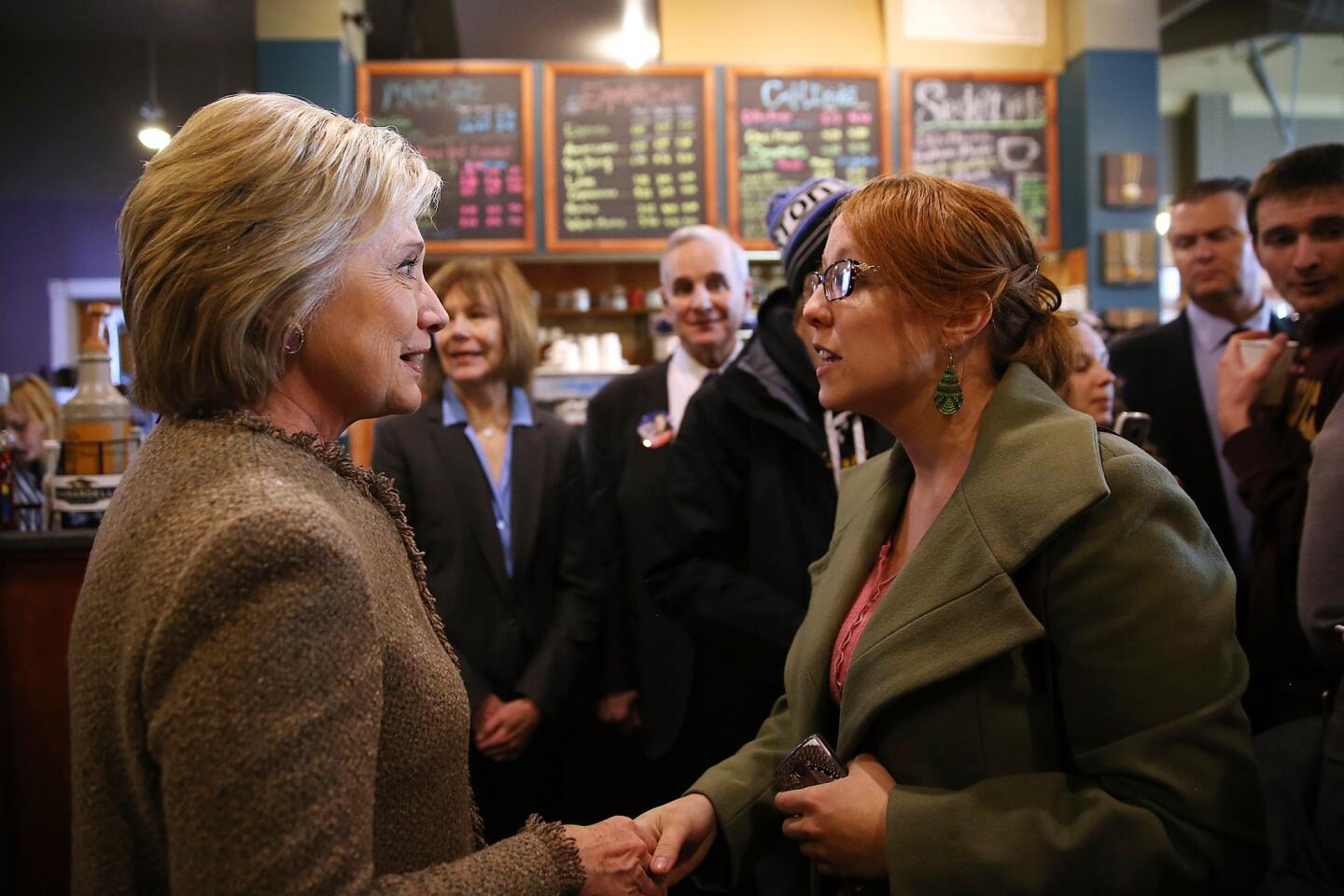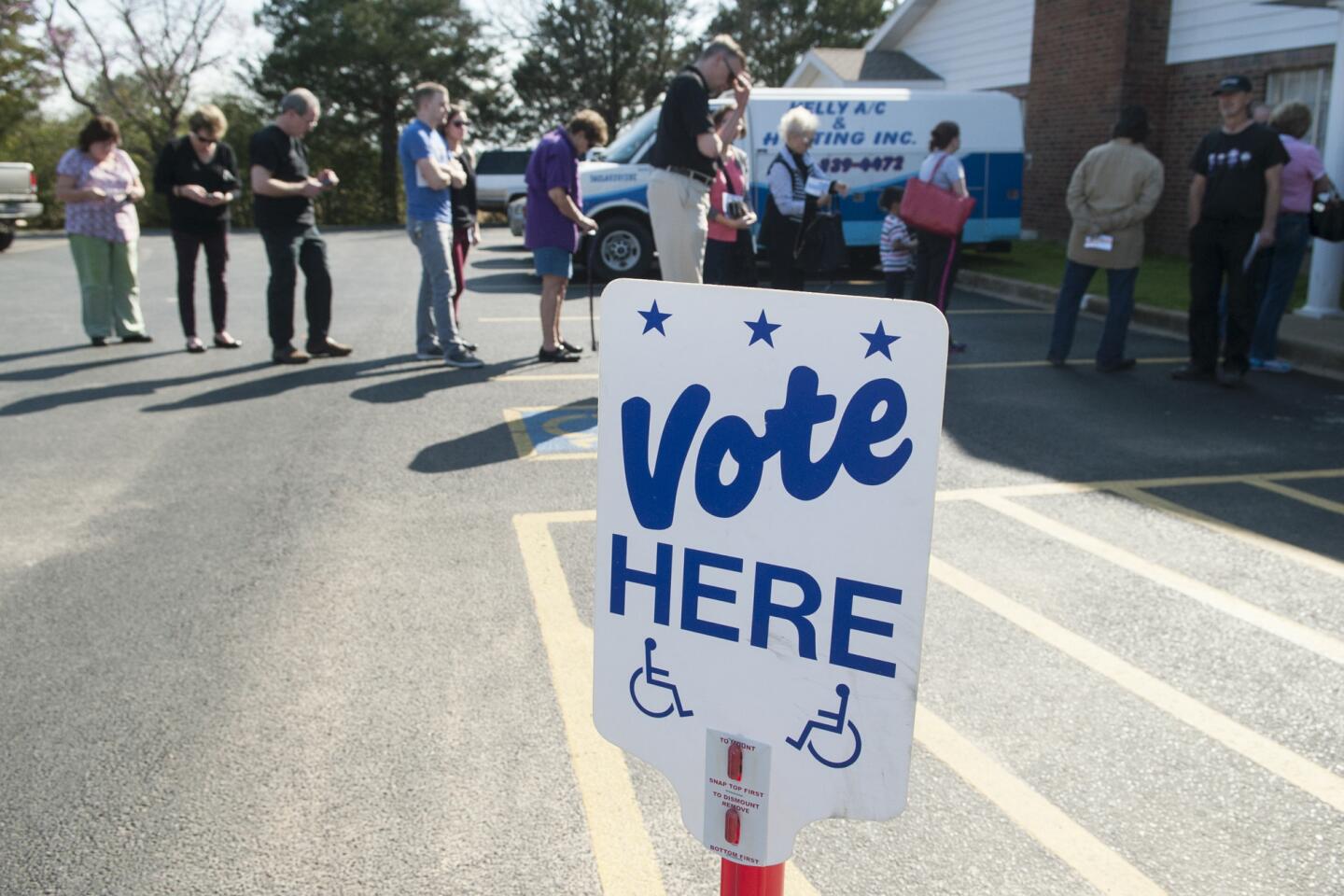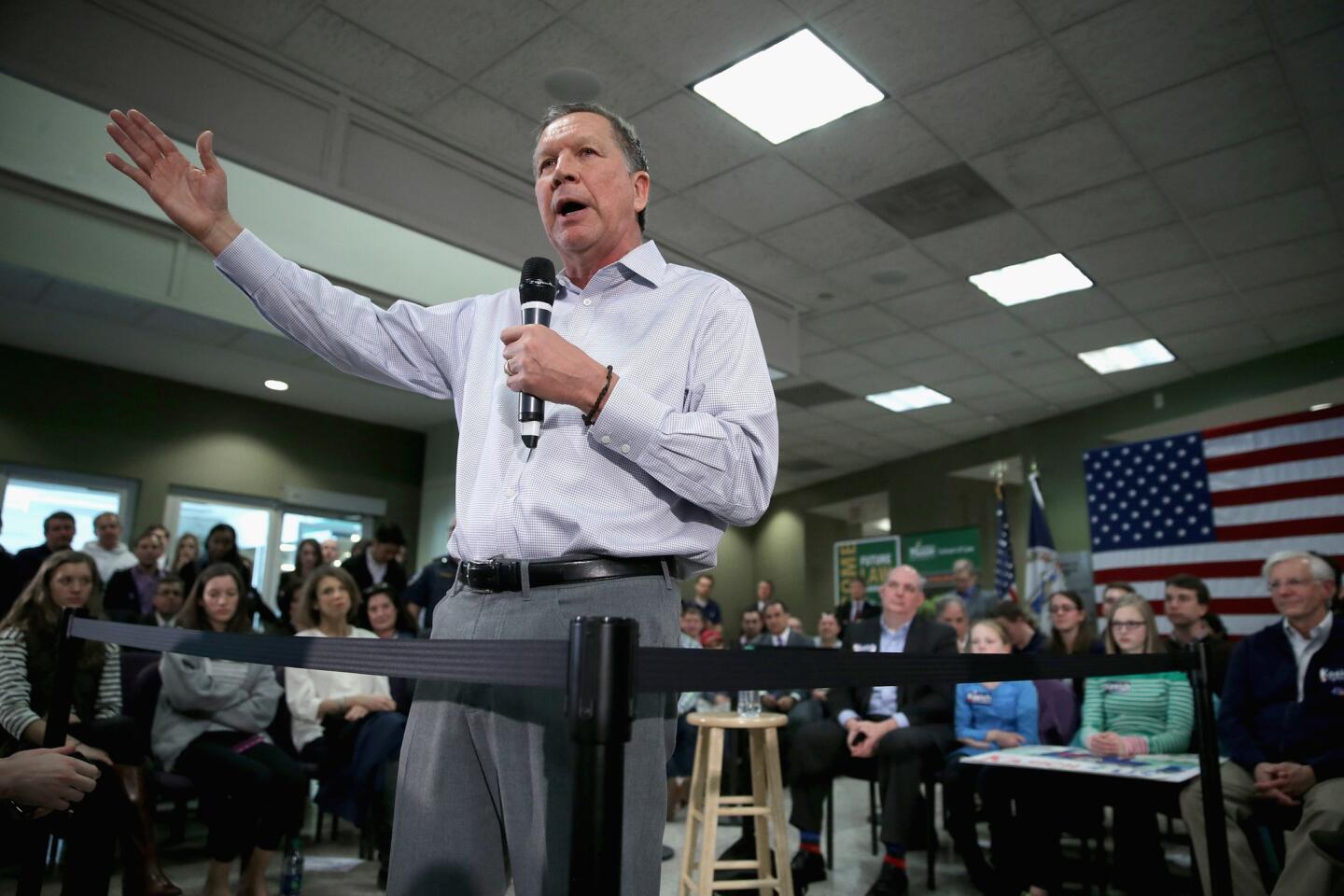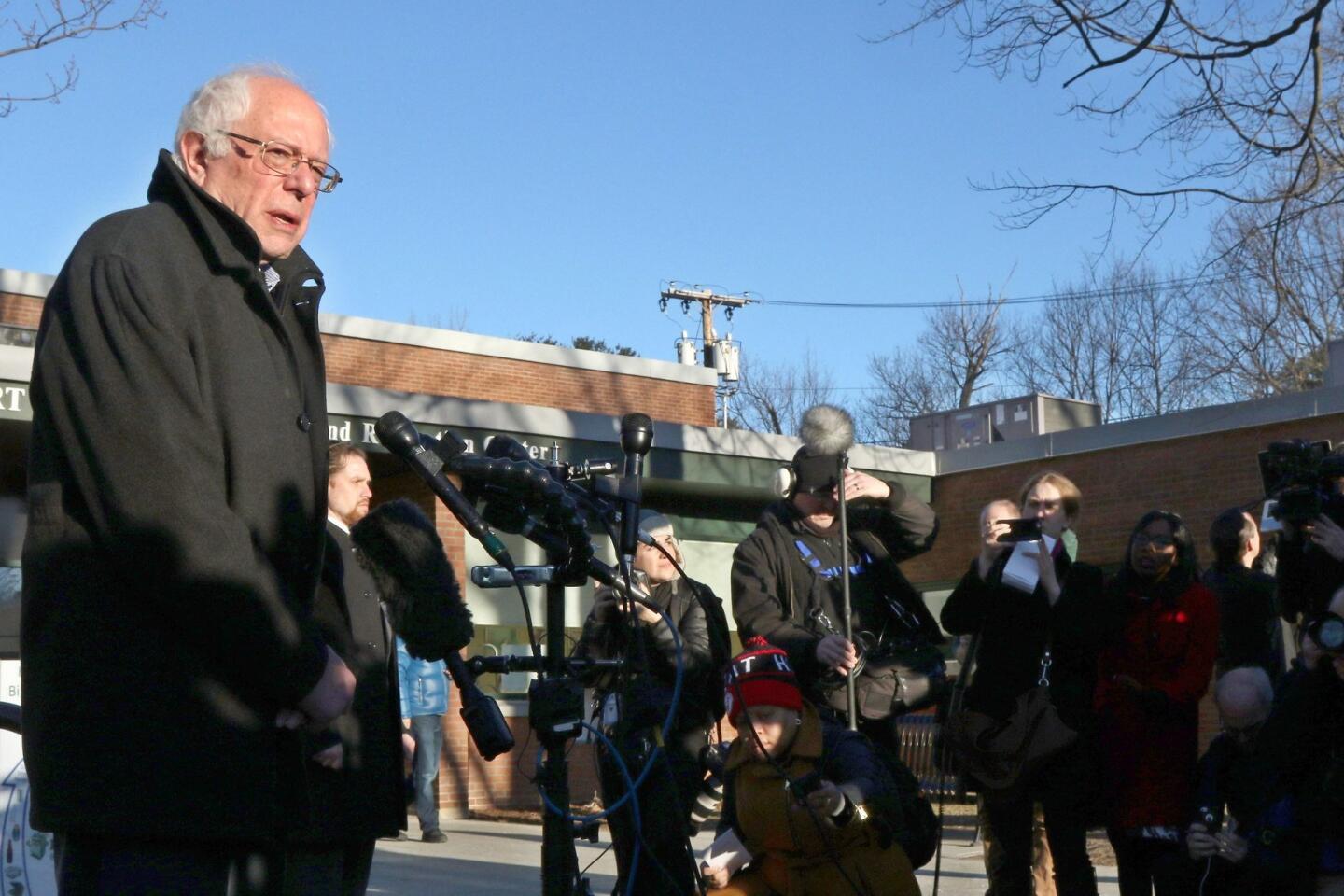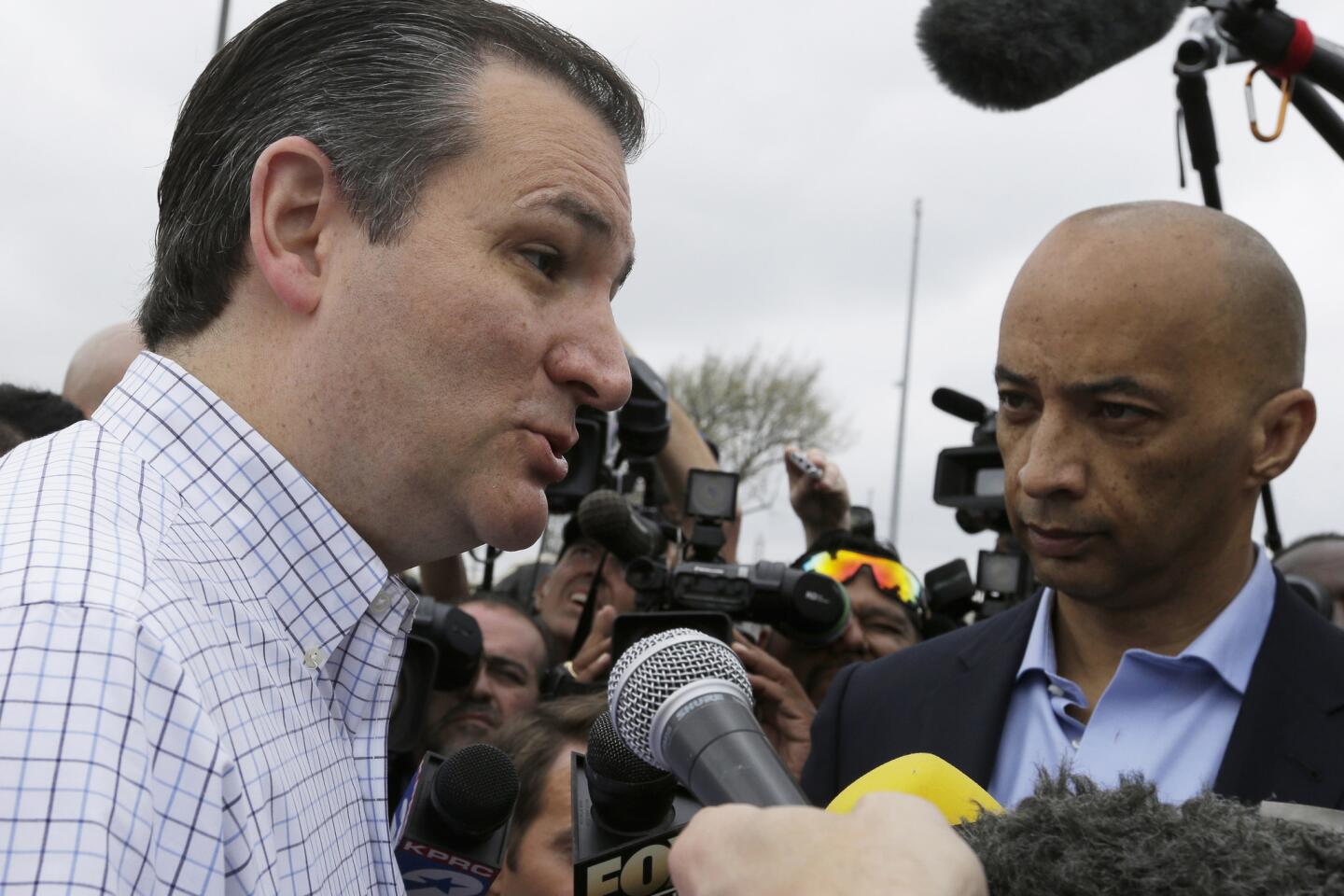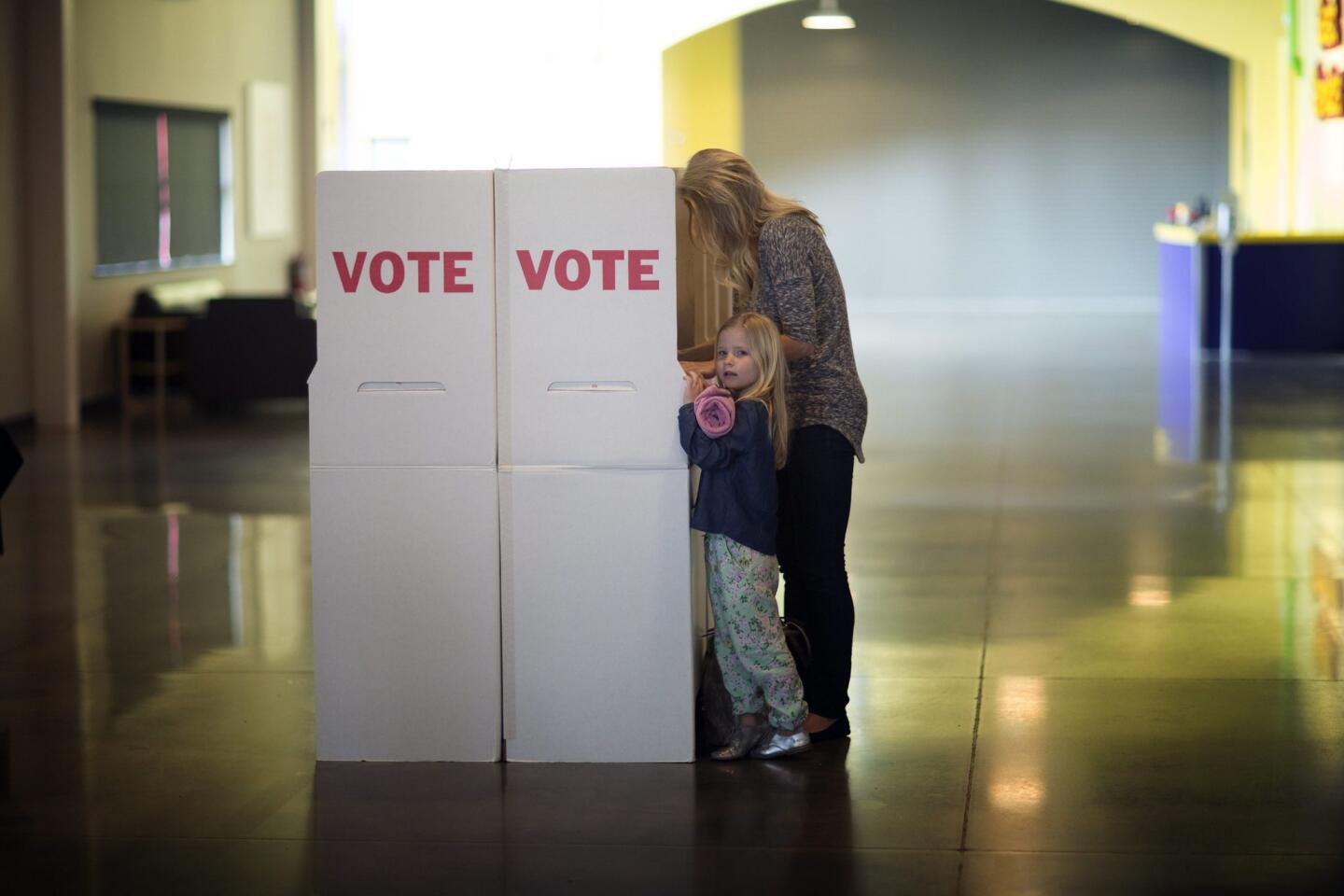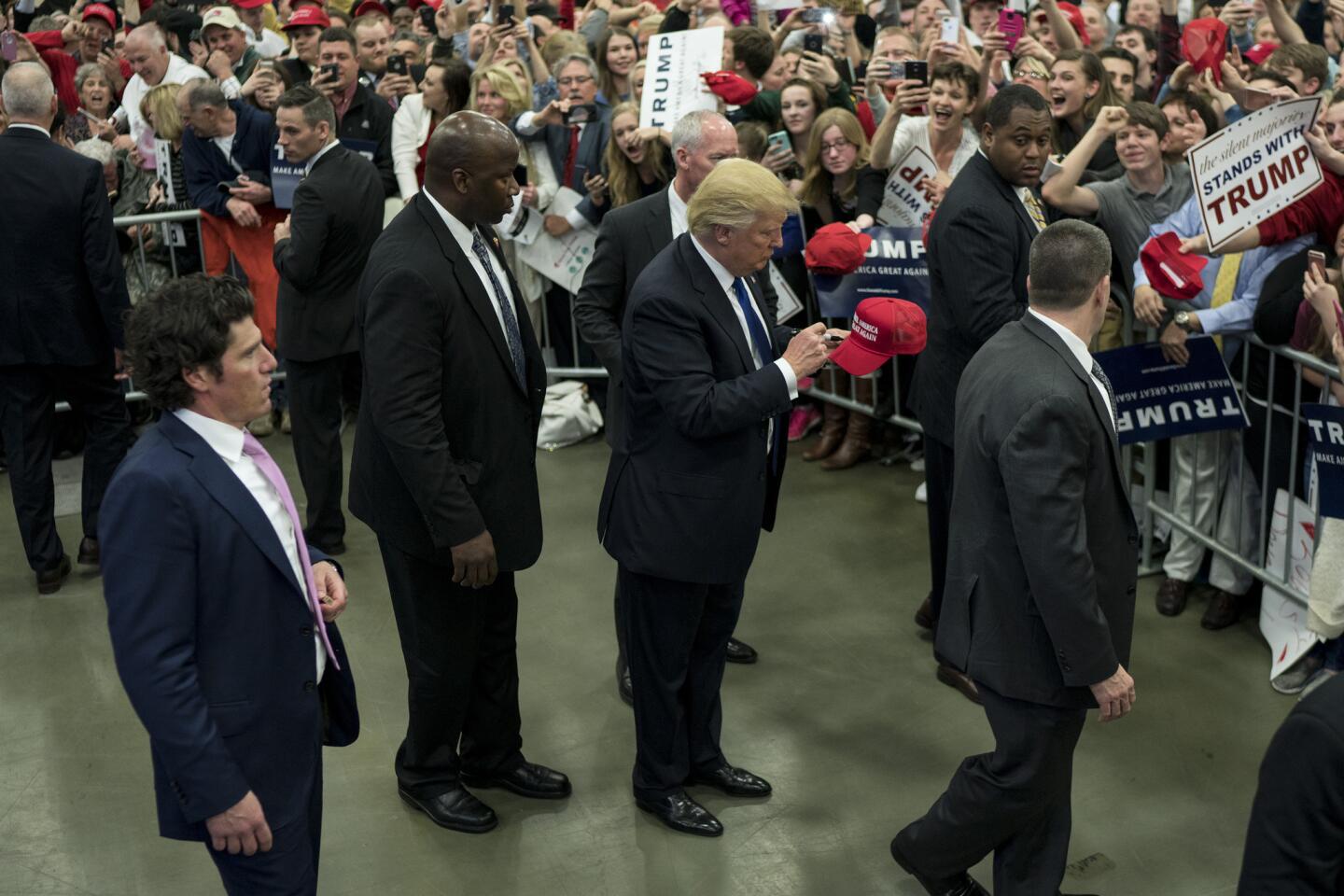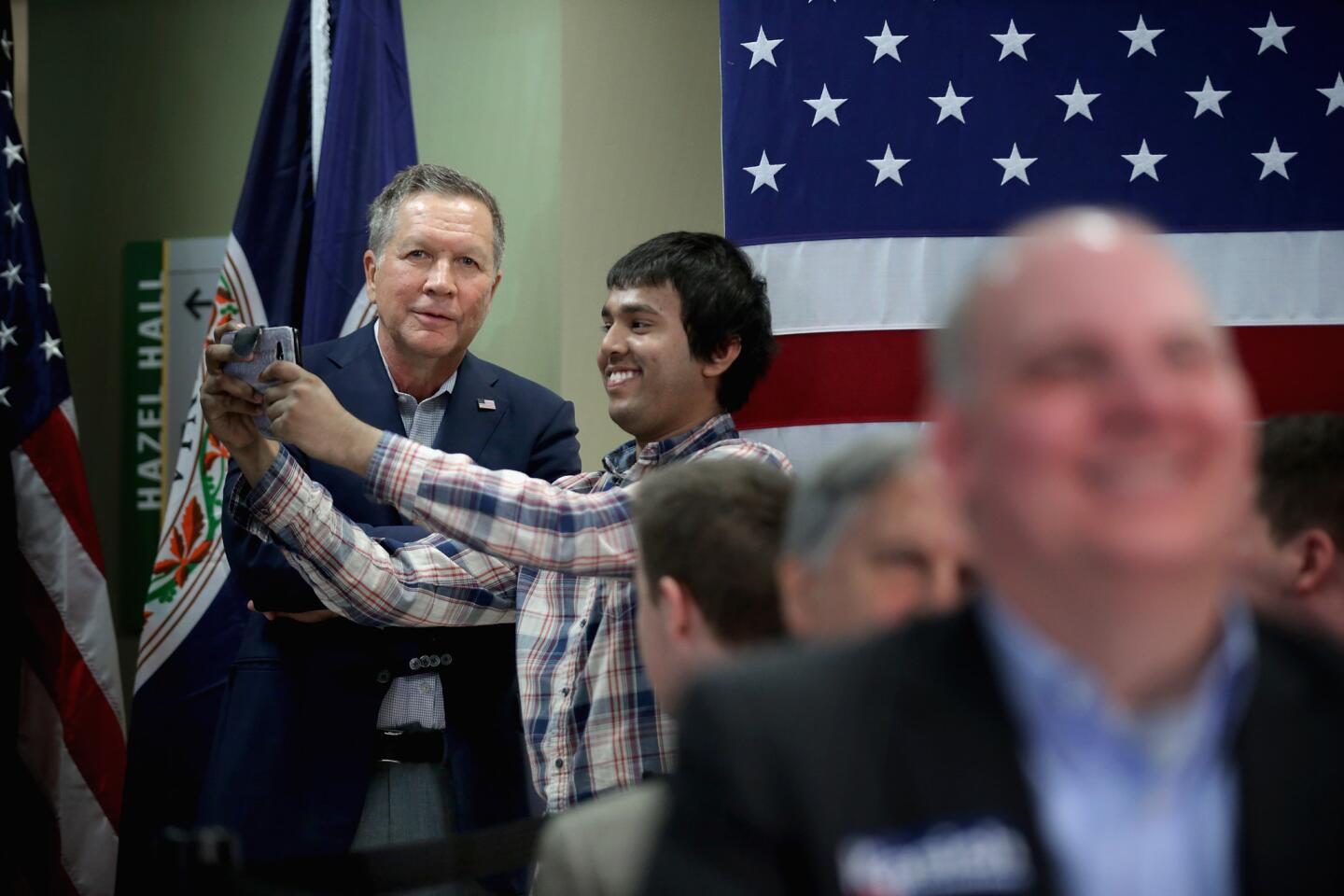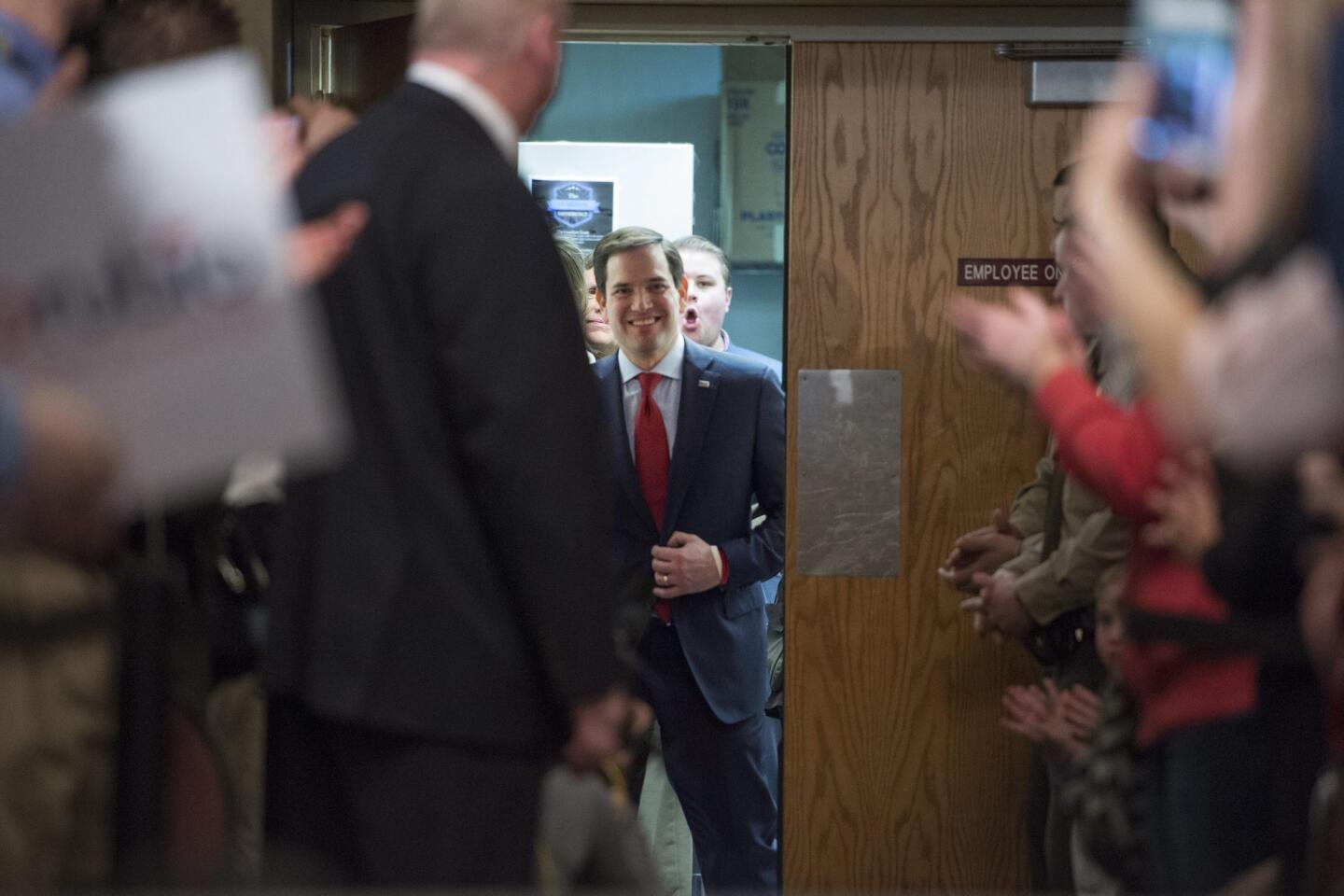With a big Super Tuesday, Trump has the Republican nomination in his sights
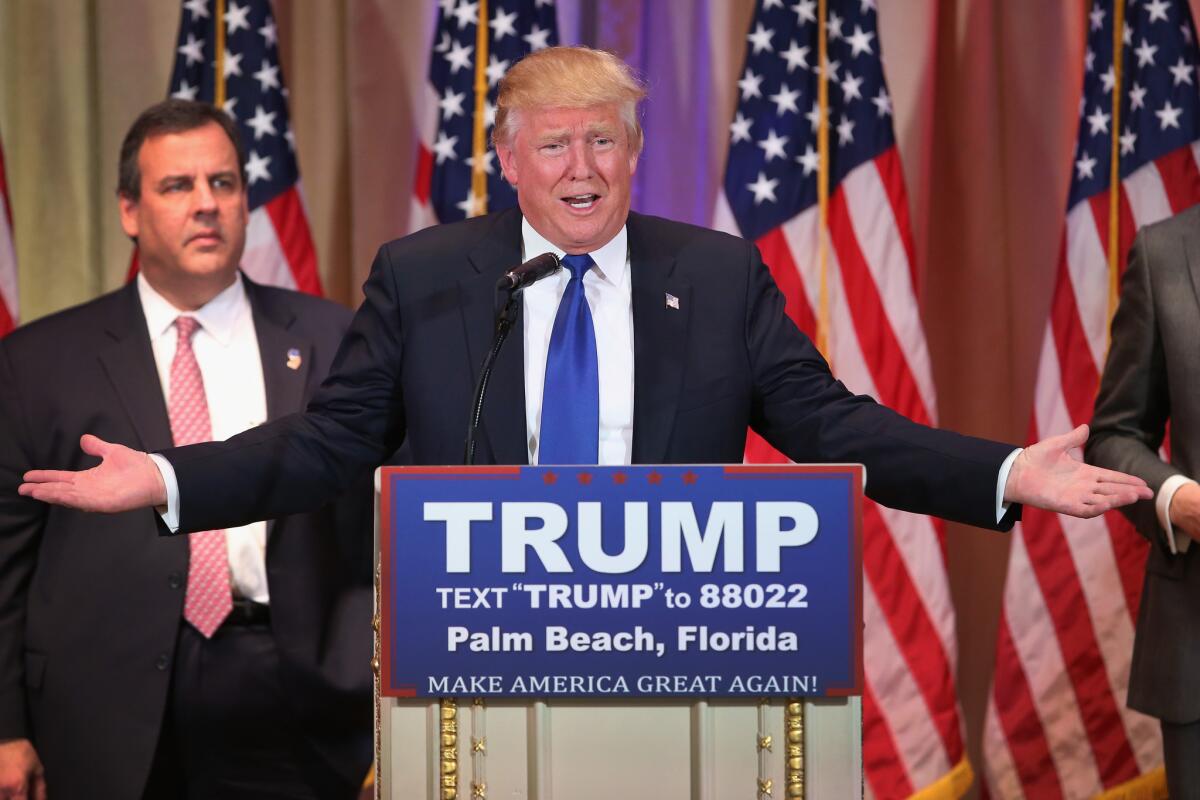
Donald Trump, forgoing the customary election night victory party, addresses reporters at a news conference at his Mar-a-Lago Club in Palm Beach, Fla. With him is New Jersey Gov. Chris Christie.
- Share via
Donald Trump rolled up big victories in the Northeast and across the South on Super Tuesday, taking a giant step toward clinching the GOP nomination as the contest moves to a series of stiff challenges for his beleaguered rivals.
Riding a wave of anger and seething frustration, Trump carried Alabama, Arkansas, Georgia, Massachusetts, Tennessee, Virginia and Vermont.
Sen. Ted Cruz won his home state of Texas, Alaska and next-door neighbor Oklahoma, strengthening his claim to be the last man standing between Trump and the nomination.
TRAIL GUIDE: All the latest news on the 2016 presidential campaign >>
But even as Cruz called for others to quit the race, he faces a steep road ahead as the contest shifts away from the South and Cruz’s advantage among its religiously oriented, deeply conservative voters.
Happy or not — and many Republicans are not — it appears increasingly probable that Trump will carry the GOP banner into the fall campaign, most likely against Democratic front-runner Hillary Clinton.
“The GOP establishment is apoplectic, but it’s too late,” said Don Sipple, a former GOP strategist turned independent. “If the party acts in an underhanded way to vanquish Trump, they will disenfranchise many voters who have been brought to the party by Trump. They are in deep doo-doo as an institution. They’re powerless right now.”
That doesn’t mean, though, establishment forces were prepared to surrender.
A political action committee that spent heavily to defeat Trump in Iowa announced late Tuesday it was intensifying efforts aimed at the billionaire insurgent, promising a TV blitz and daily attacks on his record and business dealings.
Their best hope may be Trump falling short of the delegates he needs to win outright and a rival wrestling the nomination away at a contested convention, something that has never happened in modern times.
“The chances of beating Trump outright look so much tougher after these Super Tuesday contests,” said Kevin Madden, a former Mitt Romney strategist who has stayed neutral in the GOP contest.
The biggest Super Tuesday losers appeared to be Florida Sen. Marco Rubio, who claimed a lone victory in Minnesota, and Ohio Gov. John Kasich, who did not come close to winning anywhere save Vermont, where he was running second.
Rubio and Kasich, who has yet to place first anywhere, must now wage what amount to do-or-die campaigns in their respective home states on March 15.
Forgoing the customary candidate victory party, Trump summoned the media to a news conference Tuesday night in the regal setting of his Mar-a-Lago estate, a lavish private social club in Palm Beach, Fla.
With giant chandeliers overhead and 10 furled American flags behind him, Trump congratulated Cruz on his performance, then vowed to beat Rubio — calling him “a lightweight” and “the little senator” — in two weeks in Florida. He leads Rubio by 20 percentage points or more in opinion polls.
Trump rejected the notion that he was pulling the GOP apart. “Look, we have expanded the Republican Party,” he said, adding later: “I am a unifier.”
He also vowed, once he is the nominee, to have a singular focus. “Once we get all of this finished, I am going to go after one person,” he said. “That’s Hillary Clinton.”
The Super Tuesday balloting, which extended from Vermont to Alaska, marked the single biggest day of the 2016 primary season. At stake were 595 delegates in 11 states, or close to half the number needed to secure the GOP nomination at the party’s convention in July.
Once more, signs of an angry electorate abounded.
In Georgia and Alabama — both of which Trump won handily — nearly 6 in 10 Republican voters said they felt betrayed by their own party leaders, according to exit poll interviews.
At least half the voters across the 11 states said they believed the next president should be from outside the political establishment, a dynamic that has boosted Trump throughout his improbable presidential run.
With so much ground to cover and so little time, every candidate but Trump — with his command of a national audience — had to make tactical decisions.
Cruz, a favorite of Christian conservatives, focused mainly on carrying his home state to avoid a politically fatal loss in Texas.
Speaking to raucous supporters at a suburban Houston country club, he urged rivals to quit the presidential race so he could face Trump one-on-one.
“The voters have spoken,” he said. “Tomorrow morning, we have a choice. So long as the field remains divided, Donald Trump’s path to the nomination remains more likely — and that would be a disaster for Republicans, for conservatives and for the nation.”
Rubio hopscotched among states, picking up Super Tuesday endorsements — from Arkansas Gov. Asa Hutchinson, former Oklahoma Sen. Tom Coburn, former Minnesota Gov. Tim Pawlenty — as he sought to rally the party establishment behind him as the stop-Trump candidate.
Appearing Tuesday night in Miami, he vowed to press on, looking ahead to Florida’s primary.
“Two weeks from tonight right here in Florida, we are going to send a message loud and clear,” he said. “We are going to send a message that the party of Lincoln and Reagan and the presidency of the United States will never be held by a con artist.”
Kasich was mainly focused on hanging on until the March 15 primary in Ohio. The fifth candidate still running, retired neurosurgeon Ben Carson, was not a serious factor in any of the contests.
Trump campaigned as he has throughout the race, swooping into states for big rallies and dominating the discussion by nabbing his first major endorsements — among them New Jersey Gov. Chris Christie, who joined him at his news conference Tuesday night, and Alabama Sen. Jeff Sessions — and targeting his opponents, especially Rubio, with a series of scathing attacks.
He also weathered yet another controversy after failing to disavow the endorsement of former Ku Klux Klan leader David Duke in a Sunday morning interview on CNN. Trump distanced himself from Duke a day later, saying a “lousy earpiece” kept him from properly hearing the questions.
None of that seemed to matter to voters like Texan Shelly Wells, who spurned her home-state senator to vote for Trump.
See the most-read stories this hour >>
“He can get things done,” said Wells, 59, an accountant with an oil-field services company, after casting her ballot in Katy, a Houston suburb hard hit by the recent decline in oil prices. “He’s the man who can get the job done and change this back to America instead of a third-world country.”
With candidates fighting for survival, an already harsh campaign has assumed an even sharper, meaner and more personal edge in recent days. At times, it seemed downright bizarre.
Cruz leveled unsubstantiated charges that Trump had Mafia connections. Trump attacked Rubio over his propensity to perspire. Rubio questioned both Trump’s temperament and bladder control.
But the Florida senator, who began his campaign vowing to be an upbeat messenger, did not seem altogether comfortable slipping into Trump mode. He spent days calling him a con man and hypocrite, mocked his “spray tan” and even made fun of his anatomical attributes.
Then Rubio abruptly changed his tone at a Super Tuesday-eve rally in Oklahoma. When someone in the crowd shouted, “Donald Trump has small hands!” — picking up on a Rubio double-entendre — the candidate demurred.
“We’re not talking about that today,” Rubio said. “I want this to be a serious election.”
Twitter: @markzbarabak
Times staff writers Molly Hennessy-Fiske in Katy and Michael Finnegan and Seema Mehta in Los Angeles contributed to this report.
MORE ON SUPER TUESDAY
After Super Tuesday, only desperate measures can stop Donald Trump
This wasn’t the way Chris Christie wanted to make headlines on Super Tuesday
Voters prove Donald Trump’s dominance and other takeaways from Super Tuesday
More to Read
Sign up for Essential California
The most important California stories and recommendations in your inbox every morning.
You may occasionally receive promotional content from the Los Angeles Times.

